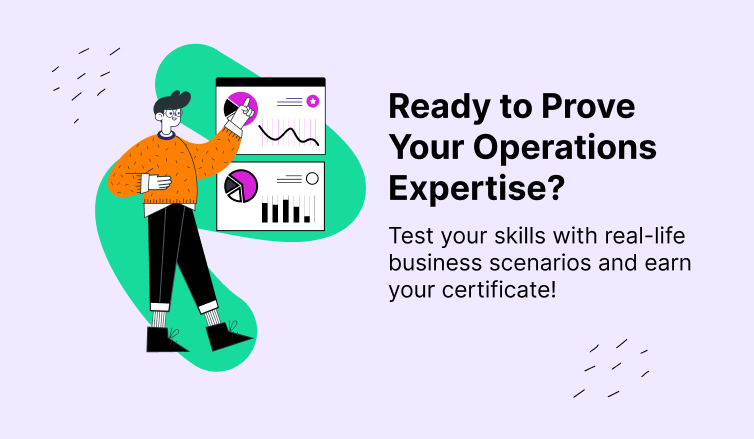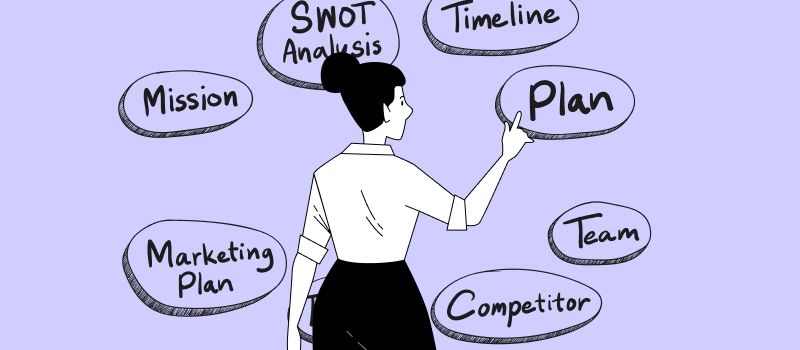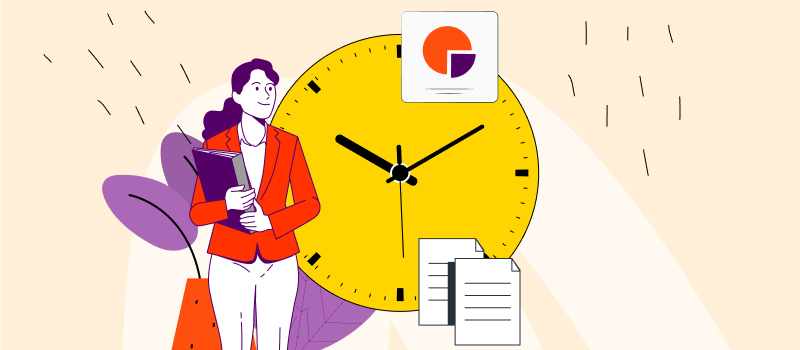Event planners or event managers have an impressive skill set and a million and one things to worry about. Depending on the niche and the scale of the events, they interview rental vendors, book caterers, negotiate hotel contracts, explore entertainment options, and more. They have to multitask daily, which made event management one of the most stressful jobs for 2019. If not kept in check, this high-pressure routine makes people lose focus and motivation and may even lead to burnout.
In this article, we collected seven best tips on how to stay focused as an event manager and keep the inner zen at the same time.
How to Stay Focused?
1. Establish Your Vision
First of all, you need to define the objectives of the upcoming event. What is it about? How can speakers, sponsors, attendees, and others get the best of the event? What can you do about it? When you know your ultimate goal, you can break it down into smaller goals and objectives that will make your vision a reality.
The set of questions may vary depending on the type of the event:
- Company events. What is the business case? Which products and services will you introduce? Are you going to educate your audience about them?
- Networking events. Will you invite speakers from other companies and hold presentations? How will you put them into a single schedule and deliver it to the visitors? When and under what circumstances attendants will be able to network: will you hold happy hours and informal parties?
- Non-profit events. What is the fundraising goal? Is it a short-term or a long-term activity? How are you going to build lasting relationships with donors?
When you have a clear picture of the goals and objectives, you can easily focus on what matters and build the proper work scope.
2. Ask Right Questions
To take out the main risks and focus on the high-level priorities, you need to ask the right questions. These questions should focus on three key things: the organizer experience, the speaker experience, and the attendee experience.
The organizer experience: Do you need volunteers to help you build the booths or check in visitors and hand them out the badges? Who will help you fix the software problems? How will you coordinate the subordinates before, during, and after the event? How will you deliver the merchandise?
The speaker experience: What goals the speakers will try to achieve? How can you help them reach their goals? How will you gather and deliver schedules to the visitors? Will visitors be able to set up individual meetings with the speakers?
The attendee experience: Will they get fresh ideas and insights into their field? Will they be offered solutions to their business problems? Will they be able to have breaks, socialize, and network? Will you hold a career expo?
This approach allows you to observe all the perspectives and meet the needs of each category of visitors.
3. Schedule It
To eliminate anxiety and improve concentration on the task at hand, define the scope of work and plan it through using daily schedules, event planning checklists, or project management software.
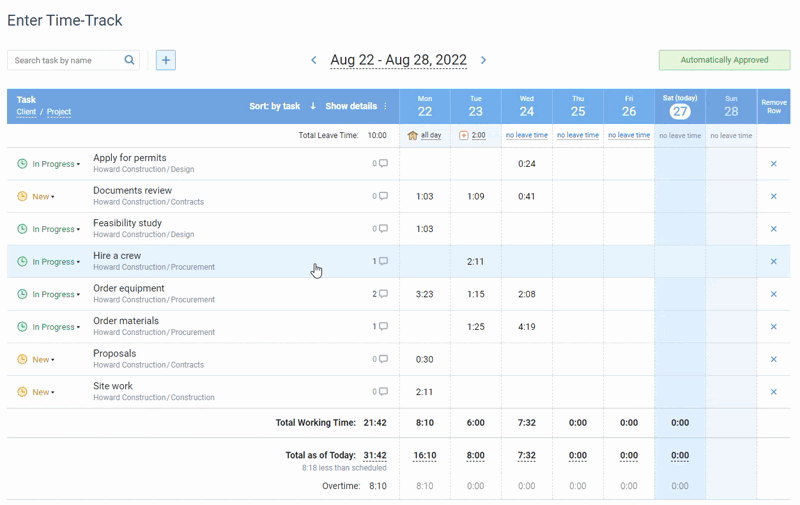
Online timesheet interface in actiTIME where every user can select task parameters
they want to see in their timesheets
The trick is to register tasks using any comfortable task management approach. According to Cal Newport, a computer science professor and author of the book “Deep Work: Rules for Focused Success in a Distracted World” task recordings help you maintain focus. If not, he says, then incomplete work harms your concentration abilities because of the Zeigarnik effect – a tendency to remember unfinished tasks instead of completed ones.
Moreover, any task management approach is better than none because it positively affects your focus and motivation when you have a visual picture of the amount of work ahead and your progress made. You might also want to create a daily ritual and start your day by setting up a daily schedule. This morning routine would allow you to tune into work and stay confident about your progress.
4. Prioritize in a Smart Way
Not all tasks are created equal. According to the Pareto principle, roughly 20% of efforts produce 80% of results. It means that you need to invest your efforts wisely.
To learn which tasks are worth your attention, you may want to use the ABCDE method. The thing is to create a task list and put each task into a category. A, B, and C are priorities – from high (A) to low (C), D tasks are meant for Delegation, and E tasks are the unnecessary ones that should be Eliminated. Next, give every A task a priority number and repeat until you sorted all the items.
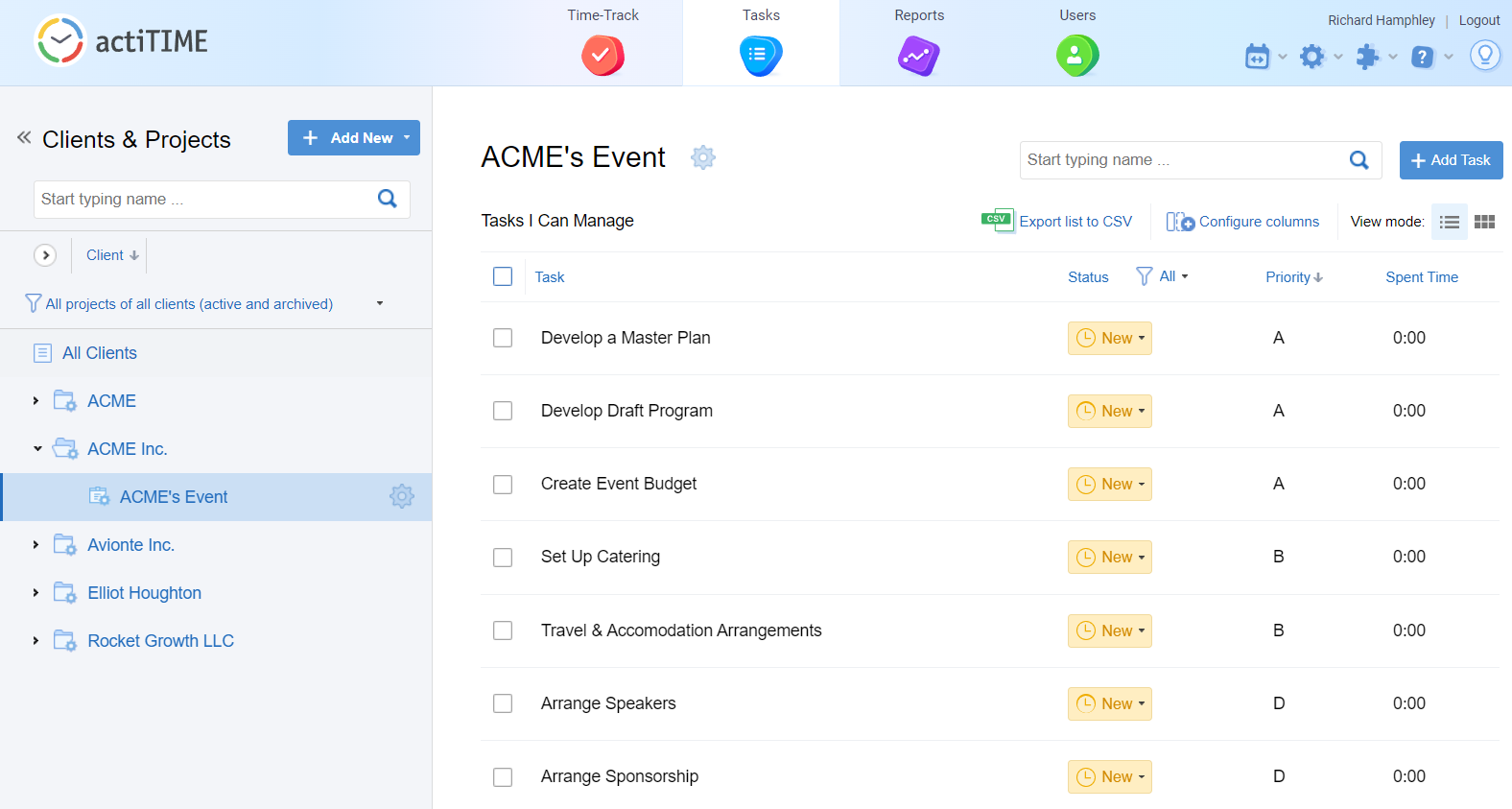
Example of the task planning in actiTIME. Create a task list, assign priority statuses, distribute tasks and start tracking time
Without the ABCDE method, it’s almost impossible to differentiate between a B1 task and an A3 one. But with the multiple-level prioritization, you can see the real importance of your tasks and invest time in the important things.
5. Concentrate on Task at Hand
Multitaskers might seem superhuman, but according to a Stanford study, they pay a high mental price. One hundred students were put through a series of experiments measuring attention spans, memory capacity, and ability to switch from one task to another. Heavy multitaskers performed worse on each of the three tests.
“When they’re in situations where there are multiple sources of information coming from the external world or emerging out of memory, they’re not able to filter out what’s not relevant to their current goal,” said Anthony Wagner, an associate professor of psychology. “That failure to filter means they’re slowed down by that irrelevant information.” These findings prove the importance of prioritizing and single-tasking for project managers and planners.
So, how to stay focused and effective as an event manager? Learn to prioritize tasks, schedule, and do one task at a time when possible.
6. Keep It Organized
Project managers need to keep many things under their control, so everything should be neatly organized.
- Use a common management platform with your team, like Google Calendar, to share upcoming deadlines and meetings.
- Keep a project-related screenshot folder on your phone and in the cloud. Use Google Drive or Dropbox to store and access your documents anytime from any device.
- Keep your time and workload under control – use paper notebooks, smartphone notes, or project management software.
To help individual users, small and middle-sized teams automate project management routines, we created actiTIME – a timesheet tool for browsers and smartphones.

With actiTIME, you can easily configure the workflow for your own needs. Customize the work level structure, add task estimates and deadlines, assign tasks to team members according to their responsibilities, and use statuses to monitor the work process.
You and your team can track time spent on particular tasks with the browser app, Chrome extension, or mobile apps. As a project manager, you can set up hourly rates, calculate billable hours, and create payrolls right in the app.
actiTIME enables us to balance workload better
I found in actiTIME all the requirements I was looking for. We are getting a lot of benefits – the tool enables us to better balance workload, have a constant view of what people are doing. I really recommend it, I evaluated a lot of tools, also had an in-house development before which demanded a lot of maintenance, and actiTIME solved all problems with no hassle.
7. Take Time for Self-Care
At times, when we handle a high workload for a long time, our productivity and focus decrease. We work more, put more effort but accomplish less. When this is the case, it’s time to disconnect and unwind.
To take care of yourself in the workplace, consider the following tips:
- To lower the pace and maintain a higher productivity level, allow a time buffer between responsibilities.
- When you feel overwhelmed at any point, take a walk – it’s proved to reduce stress and improve creativity.
- Physical comfort reduces stress, so consider investing in comfortable shoes and clothing.
- Be aware of your posture and stretch regularly. For many, stress is held in the shoulders, which strains the neck and back. Body tensions contribute to the feeling of stress and anxiety. So loosen up and release the tension.
- Meditate daily. Meditation reduces anxiety and tensions, sharpens your focus, and increases creativity. It doesn’t require any equipment so you can practice it wherever and whenever you need it.
How to Stay Focused: Key Takeaway
Event management is one of the most stressful niches. Project managers have to juggle many things at once and not lose focus and motivation to keep going. Use our tips on how to stay focused and organized: create a plan, prioritize and delegate, avoid multitasking, use project management tools, and take time to unwind. This will help you be productive every day of your professional life.






































